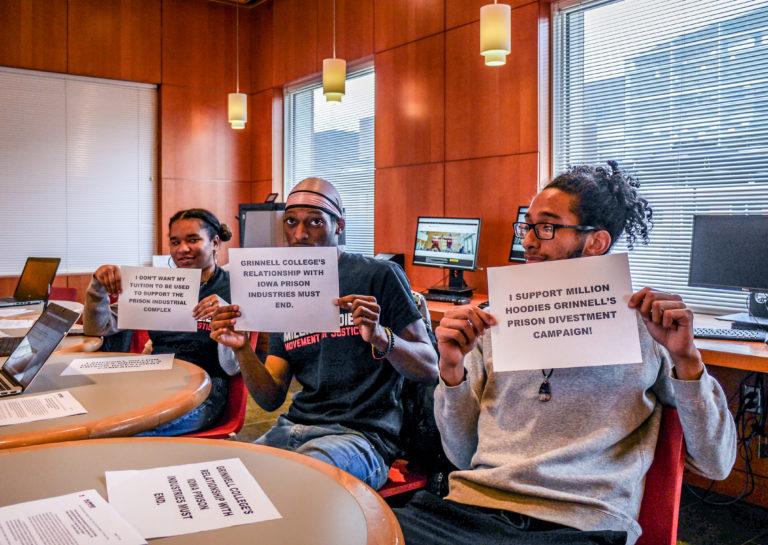By Anneliese Stattelman
stattelm@grinnell.edu
With the caucuses drawing near, Grinnell activist organizations have the option of officially endorsing candidates that fit with their missions. But on a small campus, is it an effective method for these student groups to gather supporters for their chosen candidates? To find out, The S&B spoke to the leaders of several different student groups about endorsements for the upcoming election.
Grinnell’s chapter of the Million Hoodies Movement for Justice was founded in 2018 by Malcolm Davis and Jelani McCray, both ’21. The national organization is dedicated to eradicating gun violence and reclaiming safety and justice.
“We started as a place for black and brown students to engage in political social grassroots activism. With Grinnell being a PWI (Predominantly White Institution), the activism that happens on Grinnell’s campus is great, but it’s not often led by students of color,” said Davis. The group has recently campaigned about the College’s connections to the prison-industrial complex and will hold a series of events about knowing your rights next week.
“There were a number of candidates who did have very similar views to Million Hoodies,” Davis said. “One of those was Julian Castro, who has since dropped out of the race and has endorsed Elizabeth Warren. But the way I personally see it, there’s no candidate that’s been as progressive, specifically towards incarcerated people or the issue of incarcerated people’s rights, as Bernie Sanders has been, given that he supports unequivocally giving voting rights to incarcerated people.”
Davis reached out to the national Million Hoodies organization about endorsing a candidate. He was told that the group did not have plans to release an endorsement, but that the organizations leadership did consult with Julian Castro about his stance on the justice system and injustice reform.
Farm House, one of the College’s student-directed project houses, has released an official endorsement — a nonstandard move for a College-owned living space but in keeping with their mission to “free our food,” according to their Facebook page. The House has publicly endorsed Elizabeth Warren for president.
“She has a plan to multiply funding for local food infrastructure by ten and also break up these big agriculture corporations and monopolies,” said Tommy Hexter ’21, co-founder and coordinator of the House.
Hexter thinks that food should be at the center of politics. “Tomorrow, if food became scarce, it would be the people that could grow their own food and organize around these food systems that would have all the power. … We need to be mindful of food, because food deserts are becoming an increasing problem, our farmers are being forced off the land and corporately controlled so I think that my ideal political candidate would look at the entire food system. I think if you can change the food system you can change everything else. You can change our social system, you can change our health care,” he said.
Warren comes out on top for Farm House for her campaign’s local connections. “The main thing that catches my eye–right here in town there’s Grinnell Heritage Farm and they’re the biggest organic vegetable farm in the state of Iowa. I’ve gotten to work pretty closely with them, and they were at the table with Elizabeth Warren’s policy director when they were creating her agriculture policy,” said Hexter. “She’s actually gone out and she’s built the social capital in order to enact the plans she’s got.”
Hannah Dorf ’21 and Megan Gardner ’21 are co-founders and co-leaders of the Grinnell hub of Sunrise Movement, a climate change activism group. The national organization has endorsed Bernie Sanders while leaving its hubs to make their own decisions. Grinnell’s hub has not endorsed a candidate.
“As hubs, we have a lot of our own autonomy of what we want to do,” Dorf said. “Our hub is choosing not to do something because we feel like we’re a small enough hub that it would be alienating to members.”
Dorf and Gardner have found an alternate in which the organization can support pro-environmental policies in the presidential election without expressly endorsing a candidate. “We’ve been having people fill out caucus cards,” Gardner said. “Commit-to-caucus cards are for voters to caucus for whoever they think has the best environmental plans, rather than a specific person.”



















































